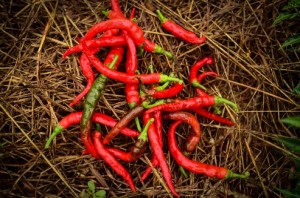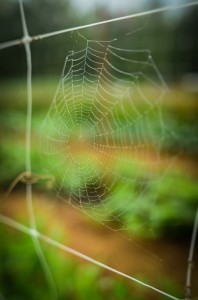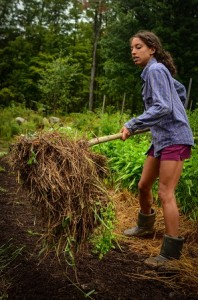
- heirloom tomato mix (2-4)
- sungold cherry tomatoes or tomatillos (3/4 pound bag)
- green bell pepper (1)
- hot pepper mix – jalapeno, Thai hot, cayenne (1/2 pound bag)
- summer squash, patty pan, yellow or green zucchini (1-2)
- green or yellow string beans (1.25 pounds)
- edamame (green soybeans) (3/4 pound) – lightly steam and eat the beans out of the pods. Do not eat the shells.
- cucumbers and/or Japanese cucumbers (6-8)
- collard greens (1bunch)
- braising green mix (1 bunch)
- head lettuce (1-2 heads)
- scallions (1 bunch)
- curly parsley (1 bunch)
- dill (1 bunch)
- dozen eggs or sprouts
ANNOUNCEMENTS
- This Saturday, August 31, 7am-12, we are processing our chickens. We are looking for helpers, so if you are interested in joining us for this, please be in touch about volunteering.
- If you ordered chickens, they will be ready for pickup Saturday after 1pm. If you specified delivery, we will bring them to you with the CSA on Wednesday. If you will not be home, delivery locations must have a cooler to put the chicken in. Please contact us if you have any questions or clarifications. I will send out an email shortly with more details.
- All poultry is sold out for the year.
- At the beginning of the season we purchase close to 300 waxed produce boxes. They are a big expense for us. We currently do not have enough to do next week’s deliveries, so please RETURN YOUR BOXES. We also still have not received all of the JARS and BAGS that went out earlier in the season. You can leave all these items where you get your share and we will retrieve them each week.
Other Announcements
- WASHING YOUR VEGGIES. We do not extensively wash veggies before delivering them to you. We will do some washing if there is a lot of dirt on greens and we always wash root crops. In general, this allows the food to stay fresher longer. It also means you need to wash your veggies before consuming them. For greens: fill a bowl with cold water. Soak greens in water for a minute. Drain water and repeat two more times. Dirt will rinse to the bottom. Bugs should float to the top.
- We are still looking for a delivery van. If you have any leads on something efficient, in decent shape, and affordable, please let us know!
- If you are a shareholder, you have the option of volunteering 5 hours over the course of the season in exchange for an additional week of food in the fall. Be in touch to schedule your work with us.
- Remember that you are always welcome to visit socially and/or to volunteer. Give a call to schedule a time.
- All of our newsletters are archived on our website, along with lots more, including educational resources and recipes.
Food Justice News
Without Our Land, We Cease To Be a People:
Defending Indigenous Territory and Resources in Honduras
By Tory Field and Beverly Bell
A Garífuna ceremony on lands stolen by organized crime networks in Honduras. Courtesy of OFRANEH.
Miriam Miranda is a leader of the Honduran Black Fraternal Organization (OFRANEH), which works with the 46 communities of the Afro-indigenous Garífuna of Honduras, to defend their territories, natural resources, identity, and rights. Miriam’s narrative below is from an interview with Beverly Bell in Washington, D.C.
We live on the Atlantic coast of Honduras. We are a mix of African descendants and indigenous peoples who came about more than 200 years ago in the island of San Vicente. Without our land, we cease to be a people. Our lands and identities are critical to our lives, our waters, our forests, our culture, our global commons, our territories. For us, the struggle for our territories and our commons and our natural resources is of primary importance to preserve ourselves as a people.
The people, for their way of being, were declared part of the Heritage of Humanity by UNESCO in 2004. We don’t know what that means exactly, but we suppose it implies that the state must take action to protect and preserve the Garífuna people’s identity.
What we Garífuna face is largely the same things faced by people all over Latin America, and in fact the world. Also, the problems of the South are not a problem just for us, but of all of us and the whole planet.
If you map out the conflicts that are threatening our country, you’ll see they reflect exactly where transnational capital is trying to take more resources from indigenous peoples. Maybe you believe that president Mel Zelaya was ousted in a coup d’état [in 2009] because he was a leftist. No. It was because [those with wealth] wanted to take land and resources, which they are now doing. Look at the search for so-called alternatives to oil – through mining, the mega-dams, the biofuels, the production of African palm oil. All these resources are being taken from indigenous areas. There is more pressure on us every day for our territories, our resources, and our global commons.
In Honduras, they’re taking land that we were using to grow beans and rice so they can grow African palm for bio-fuel. The intention is to stop the production of food that humans need so they can produce fuel that cars need. The more food scarcity that exists, the more expensive food will become. The mono-cultivation of some of these crops [for bio-fuel] requires thousands of millions of acres of land. Food sovereignty is being threatened everywhere.
Also we have a problem that is rarely spoken of: narco-trafficking. The Atlantic Coast of Honduras is the main trafficking route. A study showed that almost 90% of the drugs that are going to the North pass through Honduras. We’re exactly in the way of the trafficking and we’re so vulnerable. Honduras has one of the highest levels of crime and violence [per capita] of any country that is not actually at war. We have to fight not only for the permanence of our community, but also to not be kidnapped by traffickers.
Another of our main challenges is the tourism industry. We live almost on the sea, right on the beach. It’s a blessing but recently it’s also become a curse, because of course all those with power want to have a place on the beach. The Honduran government has started on some tourism mega-projects. The displacement of communities and the loss of cultures that come with the development of tourism [is increasing].
We have occupied and claimed ancestral lands that had been taken by others, such as Vallecito Limón. We are also using international human rights law in order to guard our territories. We have a claim against the government in the Inter-American Court of Human Rights in Washington regarding Triunfo de la Cruz [a beachside Garífuna community whose communally owned lands have been taken]. We hope to have a decision in November or December. This will create an important precedent for all indigenous peoples, not just for the Garífuna. It’ll define the responsibility of the state to protect territories and rights of indigenous peoples. This will only be the [fourth] case ever brought that will help establish policies and mechanisms to protect the territories and resources of indigenous peoples, and all of humanity, of course. [The other three are] Sarayacu in Ecuador, Saramaca in Suriname, and Awas Tingni in Nicaragua.
We are creating alliances with feminists in resistance, with other indigenous people, with campesinos, with groups like the Mesoamerican Movement against the Extractive Mining Model. These alliances are very important, and we have to strengthen them more. Nothing can come from the top; all these alliances have to be built from the community level. We are the ones on the ground resisting and creating possibilities.
We have created our own media, a community radio station for the Garífuna. In response to mass media trying to block the protection of our indigenous territories, we have created alliances with the four other community radios, and have started – together with COPINH [Civic Council of Popular and Indigenous Organizations of Honduras] a Mesoamerica Network of Community Radio.
I want to talk about the role of women defending life, culture, and territories, opposing a model of death that grows stronger each day. We are at the front of the avalanche of attacks. Everywhere throughout Honduras, like in all of Latin America, Africa, Asia, women are at the forefront of the struggles for our rights, against racial discrimination, for the defense of our commons and our survival. We’re at the front not only with our bodies but also with our force, our ideas, our proposals. We don’t only birth children, but ideas and actions as well.
The marvelous women comrades in Triunfo de la Cruz, Garífuna women, many of them elders, have incredible strength. They participate in meetings, in actions, tearing down walls that are built on the beach. They’re sustaining the Garífuna youth so that they know who they are, without shame. They’re producing the yucca that is our staple food.
If the problem is global, we have to have a global response. It’s time for every human being in the global North to take up his or her responsibility in respect to the use of resources, responsibility relative to waste and to consumption. The standard of living that you all have in the US is unsustainable. You are the button-pushers. We [on the other end] have crises piled one after another. We are trying to resist and find every solution we can, but we ask ourselves: Hmm, are we the ones consuming all this energy? If those in the North are the consumers, why are we in Honduras paying? Why are we being displaced to generate energy for others? What are we supposed to do? Leave the planet to destruct, or make a change for future generations? They won’t have land or water or air. This is not pessimism, it’s reality. The time has come.
Please respond to the urgent alert from OFRANEH’s close colleagues in the Council of Popular and Indigenous Organizations of Honduras (COPINH), where three leaders face trumped-up charges over a five-month road occupation which has blocked an illegal dam from being built on Lenca indigenous land.
Recipes
Wild Rice Edamame Salad
- 1/2 cup blanched slivered almonds
- 2 tablespoons white sesame seeds
- 4 cups cooked wild rice
- 3 medium scallions, thinly sliced (white and light green parts only)
- 2 cups shelled cooked edamame, thawed if frozen
- 2 medium carrots, peeled and small dice
- 1/2 cup dried cranberries
- 3 tablespoons olive oil
- 2 tablespoons toasted sesame oil
- 1/4 cup rice vinegar, plus more as needed
- 2 teaspoons honey
- Kosher salt
- Freshly ground black pepper
Directions
- Place the almonds in a medium frying pan over medium heat and toast, stirring often, until golden brown (do not let the nuts burn), about 8 to 10 minutes. Transfer to a large heatproof bowl. Add the sesame seeds to the pan and toast, stirring often, until golden brown, about 2 to 3 minutes. Transfer to the bowl with the almonds.
- Add the rice, scallions, edamame, carrots, and cranberries to the bowl with the almonds and sesame seeds and toss to combine.
- Whisk the olive oil, sesame oil, rice vinegar, honey, and a pinch each of salt and pepper in a medium bowl until combined. Drizzle over the rice mixture and toss to combine. Taste and season as needed with more salt, pepper, and vinegar. Cover and chill for at least one hour before serving.
Farm News
Thank you all for extension of support and love you are showing our family through this time of loss. I cannot express it better than the rabbi my brother, David Felicia’s rabbi, Victor, who said:
Life is not about perfection, but about wholeness, wholeness that embraces and emerges from brokenness. Rebbe Nachman of Bratzlav, who knew so well the loss of children, “there is nothing so whole as a broken heart…”
Finally, and what you shareholders are actually concerned with, there are tomatoes in the shares this week. A little late because of the cold summer, a little blemished because of the wet summer, but SO good. Any cracks and blemishes can be cut out or eaten around. There are a few varieties of heirloom tomatoes, which means these seeds have been saved and bred for many many generations of farmers. Their beauty and taste is thanks to them. Enjoy, and let the juice run down your arm.
- sungold cherry tomatoes or tomatillos
- green bell pepper (1)
- brocolli bunch, summer squash or zucchini
- green or yellow string beans (2 pounds)
- edamame (green soybeans) (~1 pound) – lightly steam and eat the beans out of the pods. Do not eat the shells.
- cucumbers and/or Japanese cucumbers (4-6)
- red chard(1bunch)
- celery or head lettuce (1-2 heads)
- carrots (1 bunch)
- salad mix (3/4 pound)
- dill (1 bunch)
- dozen eggs or sprouts
Announcements
- Please RETURN YOUR BOXES, JARS, BAGS and clean egg cartons. You can leave them where you get your share and we will retrieve them each week.
- WASHING YOUR VEGGIES. We do not extensively wash veggies before delivering them to you. We will do some washing if there is a lot of dirt on greens and we always wash root crops. In general, this allows the food to stay fresher longer. It also means you need to wash your veggies before consuming them. For greens: fill a bowl with cold water. Soak greens in water for a minute. Drain water and repeat two more times. Dirt will rinse to the bottom. Bugs should float to the top.
- We are still looking for a delivery van. If you have any leads on something efficient, in decent shape, and affordable, please let us know!
- If you are a shareholder, you have the option of volunteering 5 hours over the course of the season in exchange for an additional week of food in the fall. Be in touch to schedule your work with us.
- Pasture raised poultry for mid summer and fall is available for pre-sale here.
- Remember that you are always welcome to visit socially and/or to volunteer. Give a call to schedule a time.
- All of our newsletters are archived on our website, along with lots more, including educational resources and recipes.
Food Justice News
We are so busy on the “food justice” front that its hard to make the time to explain it all! As part of our work with the Albany Food Justice Coalition, we are coordinating an educational community dinner at the Trinity Center in the South End on September 7. There will be delicious, nutritious food, cooking instruction, short film, and conversation on food security issues relevant to the community. We are also anticipating the report-out of the Arbor Hill Community Center youth who have collected 1000!!! surveys on barriers to food security in Arbor Hill, South End, and West Hill. They will be sharing their findings in early September after much hard work interviewing folks at community events, pantries, and health centers.
Recipes
Farm News
This is an ode to Capers, Alicia, and Sade, our amazing interns! While you harvested and weeded into the night, we…

